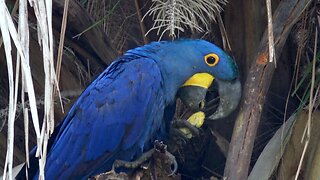Premium Only Content

Gigantic whale shark casually swims past scuba divers
Whale sharks are the animals that are most deserving of the name "gentle giants". They grow to an incredible 18m (55 feet) in length and can reach an estimated weight of more than 42,000kg (100,000lbs). They are known to travel great distances and they occupy all tropical and sub tropical oceans. Yet very little is known about how they reproduce or why they congregate in the Galapagos Islands as they do.
Three strong ocean currents converge in the remote islands of Darwin and Wolf in the Galapagos. Part of Ecuador, the Galapagos Islands straddle the equator, yet the Humboldt current brings cold water to this area and it creates a unique and surprisingly temperate climate in an area that would be expected to be one of the warmest regions on the planet. These currents bring an abundance of plankton, fish, and other food sources for marine animals of all kinds. It would be the perfect environment for a whale shark to thrive, coming here what would be perfect feeding grounds. Yet, whale sharks are not seen feeding in these plankton-rich waters.
Almost all of the whale sharks found here are pregnant females, ready to give birth to their pups. But researchers and scientists will almost never witness this miracle in action, and they don't even know where the young go in the first months of their lives.
Scuba divers also congregate in these waters, traveling from all over the world, hoping to catch even a glimpse of one of these goliaths as they slowly swim through the area. Whale shark sightings are a bucket list item for scuba and nature enthusiasts. These lucky divers were treated to more than a glimpse as this magnificent lady casually cruised right up to them and circled around as if she was inspecting them. Fearless, the whale sharks do not see people as a threat. They are so massive that a clumsy person in the water could do them no harm. This is mutual, as whale sharks do not possess teeth, or even the ability to harm people, except for the possibility of a collision.
These giants are filter feeders, feeding by opening their mouths wide to capture eggs, plankton, and small fish. They have little ability to defend themselves against predators, except by out swimming them, or diving deeper than their predators can go.
These gentle beasts are truly awe inspiring to witness in their natural environment.
-
 2:11
2:11
WildCreatures
7 days ago $1.23 earnedBrilliant Blue Hyacinth Macaw Eats Nuts With Impressive Dexterity
16.1K16 -
 1:56:48
1:56:48
Tundra Tactical
2 hours ago $2.80 earnedFull Semi-Auto Comedy Hour
13.5K2 -
 2:07:31
2:07:31
The Connect: With Johnny Mitchell
11 hours ago $1.50 earnedSecrets Of The Cocaine Cowboys: Miami Drug Lord Reveals Truth About His BILLION-DOLLAR Coke Empire
13K -
 DVR
DVR
BlackDiamondGunsandGear
1 day agoGlocks Want Gun Control? // Trump Tramples on your Rights? // After Hours Armory
12.8K1 -
 DVR
DVR
DLDAfterDark
7 hours ago $0.76 earnedDLD Live! Trump - Flag Burning - Glock & Gun Control - Martial Law Light?? - After Hours Armory
8.56K -
 LIVE
LIVE
GritsGG
13 hours agoRumble Customs! 3515 Ws! 🫡!
301 watching -
 5:59:47
5:59:47
SpartakusLIVE
8 hours agoThe HUGEST Brain (not forehead) delivers Saturday SPARTOONS || Variety Later - Shadow of Mordor
181K4 -
 2:34:20
2:34:20
Barry Cunningham
9 hours agoPRESIDENT TRUMP WELCOMES FOOTBALL SEASON! AND MORE BREAKING NEWS!
72.6K45 -
 54:47
54:47
Side Scrollers Podcast
13 hours agoSide Scroller Presents KING OF THE KART | MASSIVE MARIO KART TOURNAMENT
41.7K -
 4:12:33
4:12:33
Mally_Mouse
13 hours ago🔥🍺Spicy HYDRATE Saturday!🍺🔥-- Let's Play: Baldur's Gate!
34.2K3